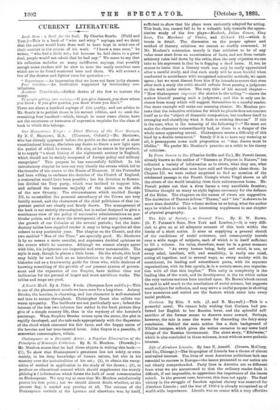Shakespeare as a Drantatic Artist a Popular Illustration of the
Principles of Scientific Criticism. By R. G. Moulton. (Frowde.)—
Mr. Moulton states that he had three objects in writing this book :— (1), To show that Shakespeare's greatness lies not solely, or even mainly, in his deep knowledge of human nature, but also in his mastery over the technicalities of his art ; (2), to obtain the recog- nition of method in application to the study of the drama ; (3), to produce an educational manual which should supplement the merely philologie ii information which forms the bulk of most commentaries on Shakespeare. We may say at once that Mr. Moulton satisfactorily proves his first point ; but we should almost doubt whether, at the present day, it needed any proving at all. The success of the Shakespeare revivals at the Lyceum and elsewhere was, by itself,
sufficient to show that his plays were eminently adapted for acting. This book, too, cannot fail to be a valuable help towards the appre- ciative study of the five plays—Macbeth, Julius Omar, King Lear, The Merchant of Venice, and Richard III.—which it treats in detail. The discussion on the proper sphere and method of literary criticism we cannot so readily commend. If Mr. Moulton's contention merely is that criticism to be of any value must start from an examination of facts, and not from certain arbitrary rules laid down by the critic, then the only objection we can take to his argument is that he is flogging a dead horse. If, too, he means to insist that a literary work can only be really appreciated after a careful study, and that each study will be most fruitful when conducted in accordance with recognised scientific methods, we again agree ; but we must dissent from him if he intends to assert that even after such a study the critic should refrain from passing a judgment on the work under review. The very title of his second chapter- " How Shakespeare improves the stories in the telling "—shows the author himself passing such a judgment ; and this is only one in- stance from many which will suggest themselves to a careful reader. One more example will make our meaning clearer. Mr. Moulton pro- tests that the inductive criticism for which he pleads does not concern itself as to the "object of dramatic composition, but confines itself to arranging and classifying what it finds in existing dramas." If this is the case, what is the meaning of the following P—" He must not make the character extraordinarily bad, or there is a danger of the whole scene appearing unreal. Shakespeare meets a difficulty of this kind by a double treatment." Surely if it is to have any meaning at all, it presupposes some such proposition as "that drama must be lifelike." We prefer Mr. Moulton's practice as a critic to his theory of criticism.














































 Previous page
Previous page